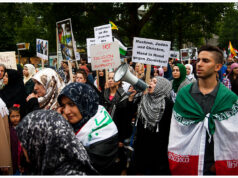Europe is unquestionably vital to the United States in economic, political, and intellectual terms. As the Muslim population in Europe continues to expand at a rapid rate, critical questions abound over the continent’s future. As it stands now, the European-Muslim relationship will likely take one of three paths: harmonious integration, the expulsion of Muslims, or an Islamic takeover. Each scenario has huge implications for the rest of humanity, and especially the United States, which counts on Europe as a source of ideas, people, and goods.
Muslims Rule
Numerous analysts predict a Muslim takeover of Europe. The late Oriana Fallaci observed that, with the passage of time, Europe would become “a province of Islam, a colony of Islam.” Historian Bat Ye’or has dubbed this colony “Eurabia.” Mark Steyn, in America Alone: The End of the World as We Know It, argues that much of the Western world “will not survive the twenty-first century, and much of it will effectively disappear within our lifetimes, including many if not most European countries.” Three factors—faith, demography, and a sense of heritage—argue for Europe being Islamized.
Faith: Christianity is fading in Europe. In London, researchers estimate that more Muslims attend mosques on Friday than Christians attend churches on Sunday, although the city is home to roughly seven times more Christians than Muslims. In Christianity’s place, an extreme secularism predominates in Europe, especially among its elites, to the point that believing Christians (such as U.S. President George W. Bush) are seen as mentally unbalanced and unfit for public office. In 2005, Rocco Buttiglione, a distinguished Italian politician and Catholic believer, was denied a position as Italy’s European Union commissioner because of his views on such issues as homosexuality.
The buoyant faith of Muslims, with its attendant jihadi sensibility and Islamic supremacism, could not differ more from that of lapsed European Christians. This contrast leads many Muslims to see Europe as a continent ripe for conversion and domination. Outrageous supremacist claims result, such as the statement of Omar Bakri Mohammed, “I want Britain to become an Islamic state. I want to see the flag of Islam raised in 10 Downing Street.” One Belgium-based imam predicted, “Soon we will take power in this country. Those who criticize us now, will regret it. They will have to serve us. Prepare, for the hour is near.”
Population: Demographics also bode poorly for Europe’s Christians. Europe today averages about 1.4 children per woman, whereas sustaining one’s population requires just over two children per couple, or 2.1 children per woman. The existing rate is just two-thirds of what it needs to be.
To avoid a severe diminution of population, Europe needs immigrants—lots of them. That imported third of the population tends to be Muslim, in part because Muslims are close by—it’s less than 10 miles from Morocco to Spain, only a few hundred to Italy from Albania or Libya; in part because colonial ties continue to bind South Asia to Britain or the Maghreb to France; and in part because of the violence, tyranny, and poverty so prevalent in the Muslim world today, which prompts wave after wave of emigration.
Although the Muslim fertility rate is falling, it remains significantly higher than that of Europe’s indigenous population. In Brussels, “Muhammad” has for some years been the most popular name given to infant boys, while Amsterdam and Rotterdam are on track to be, by about 2015, the first major European cities with majority Muslim populations.
Sense of Heritage: What often is depicted as Europe’s political correctness reflects a deeper phenomenon: a sense among many Europeans that their historic culture is not worth saving. Perhaps the country least prone to this alienation is France, where traditional nationalism still holds sway and the French take pride in their identity. Britain is perhaps the most alienated country, as symbolized by a pathetic government program, “ICONS—A Portrait of England,” that seeks to rekindle patriotism by connecting Britons to their “national treasures,” such as Winnie the Pooh and the miniskirt.
This diffidence has had direct and adverse implications for Muslim immigrants. As Aatish Taseer explained in Prospect magazine, “Britishness is the most nominal aspect of identity to many young British Pakistanis.” In fact, “for many second-generation British Pakistanis, the desert culture of the Arabs held more appeal than either British or subcontinental culture.” As a result, the “extra-national worldview of radical Islam became one available identity for second-generation Pakistanis.”
To sum up: this first argument holds that Europe will be Islamized because the yin of Europe and yang of Muslims fit so well: low and high religiosity, low and high fertility, low and high cultural confidence.
Muslims Rejected
There is also a strong argument that Europe will fast become an inhospitable place for Muslims. American author Ralph Peters, for example, believes that, “Far from enjoying the prospect of taking over Europe by having babies, Europe’s Muslims are living on borrowed time.” He asserts that, “predictions of a Muslim takeover of Europe … ignore history and Europe’s ineradicable viciousness.” Depicting Europe as the place that “perfected genocide and ethnic cleansing,” he predicts its Muslims “will be lucky just to be deported,” and not killed.
Claire Berlinski, in Menace in Europe: Why the Continent’s Crisis Is America’s, Too, implicitly agrees with Peters, pointing to the “ancient conflicts and patterns … now shambling out of the mists of European history,” which could well trigger violence.
This scenario foresees indigenous Europeans—who still constitute 95 percent of the continent’s population—waking up one day and reclaiming their historic order. This would not be surprising, given that the European masses (less so among the elite) have been chafing from changes already underway. Illustrations of that resentment include the anti-hijab (head covering) legislation in France, irritation over the restrictions of national flags and Christian symbols, and the insistence on serving wine at state dinners, despite Muslim protests. A movement spontaneously developed in several French cities in early 2006 to serve pork soup to the poor, thus intentionally excluding Muslims, who cannot eat pork according to their religious dietary laws.
These are minor issues, to be sure, but insurgent anti-immigrant parties have already emerged in many European countries and are beginning to demand not just effective control of borders but the expulsion of illegal immigrants. Indeed, a nativist movement throughout Europe is forming largely beneath the radar.
This movement, which typically includes parties opposed to immigration and Islam, is rooted in neo-fascism. Over time, these parties have deliberately reinvented themselves, shedding their anti-Semitic origins and their dubious economic theories, focusing instead on the questions of faith, demography, and identity, and learning about Islam and Muslims. The British National Party and Belgium’s Vlaamse Belang are two examples of such a move toward respectability, which may one day be followed by electability. The presidential race in France in 2002 came down to a contest between Jacques Chirac and the neo-fascist Jean-Marie Le Pen.
Other anti-immigration parties have already tasted power in Europe. Jörg Haider and the Freiheitliche Partei Österreichs were briefly in office in Austria. The Lega Nord in Italy was, for years, part of the ruling coalition. They will likely grow stronger, primarily because their anti-Islamist and even anti-Muslim messages increasingly resonate among the mainstream. Indeed, mainstream parties are already adopting some of these positions. Denmark’s Conservative Party, for example, came to power in 2001 thanks to swelling Danish anger over Muslim immigration. These parties stand to benefit when immigration to Europe surges to even-higher levels, as many indications suggest will happen.
Once in power, nationalist parties will reject multiculturalism and work assiduously to re-establish traditional values and mores. While their means cannot be predicted, and the subsequent Muslim reaction is even harder to foretell, the French “intifada” of late 2005, in which young Muslims took to the streets, clashed with police and caused tens of millions of euros in destruction, may be a harbinger for what awaits.
How would the nationalists respond? For years, Muslims have worried about incarceration and brutalization, followed by expulsion or even massacres. In the late 1980s, the late Kalim Siddiqui, director of London’s Muslim Institute, raised the specter of “Hitler-style gas chambers for Muslims.” Shabbir Akhtar warned in his 1989 book, Be Careful With Muhammad, that “the next time there are gas chambers in Europe, there is no doubt concerning who’ll be inside them,” meaning Muslims.
But these scenarios are far-fetched. Muslims—in keeping with recent patterns of intimidation and terrorism in Europe and beyond—are more likely to initiate violence. Indeed, it is more likely that European efforts at reclamation will be initiated peaceably and legally, but that Muslim violence, inspired by the aggressive Islamist ideology, could spark a wider conflict.
Muslims Integrated
In the happiest scenario, Europeans and Muslim immigrants will find a modus vivendi and live together harmoniously. Perhaps the classic statement of this optimistic expectation was a 1991 study entitled, “La France, une chance pour l’Islam” (France, an Opportunity for Islam), by Jeanne-Hélène and Pierre Patrick Kaltenbach. “For the first time in history,” they wrote, “Islam is offered the chance to waken in a democratic, rich, laic, and peaceable country.”
Others too share this hope. An Economist leader from mid-2006 asserts that, “for the moment at least, the prospect of Eurabia looks like scaremongering.” Also at that time, Jocelyne Cesari, associate professor of Islamic studies at the Harvard Divinity School, claimed a balance exists. Just as “Islam is changing Europe,” she said, “Europe is changing Islam.” She finds that, “Muslims in Europe do not want to change the nature of European states” and expects them to adapt themselves into the European context.
Such optimism, unfortunately, has little foundation. Europeans could yet rediscover their Christian faith, have more babies, and cherish their own heritage. They could encourage non-Muslim immigration or acculturate the Muslims already among them. But such changes are not now underway, nor are their prospects promising.
Rather, Muslims are cultivating grievances and ambitions at odds with their indigenous neighbors. Worryingly, each generation appears more alienated than its predecessor. Those polls of British Muslims for example, find that a majority of them perceive a conflict between their British and Muslim identities and want shari’a (Islamic law) instituted.
Even Bassam Tibi, professor at the University of Göttingen, who has often warned that “Either Islam gets Europeanized, or Europe gets Islamized,” has given up on the continent. He recently announced that he would leave Germany after 44 years to move to Cornell University in the United States.
Which Europe?
As columnist Dennis Prager notes, “It is difficult to imagine any other future scenario for Western Europe than its becoming Islamicized or having a civil war.” Do these two deeply unattractive alternative paths define Europe’s choices? It would appear so, but the decisive events that will resolve this question have yet to take place. The novelty and magnitude of Europe’s predicament make it difficult to understand, tempting to overlook, and nearly impossible to predict. Within the next decade or so, however, the current state of flux will end, the Europe-Islam equation will come into sharper relief, and the continent’s future will reveal itself.
Daniel Pipes is director of the Middle East Forum in Philadelphia.





